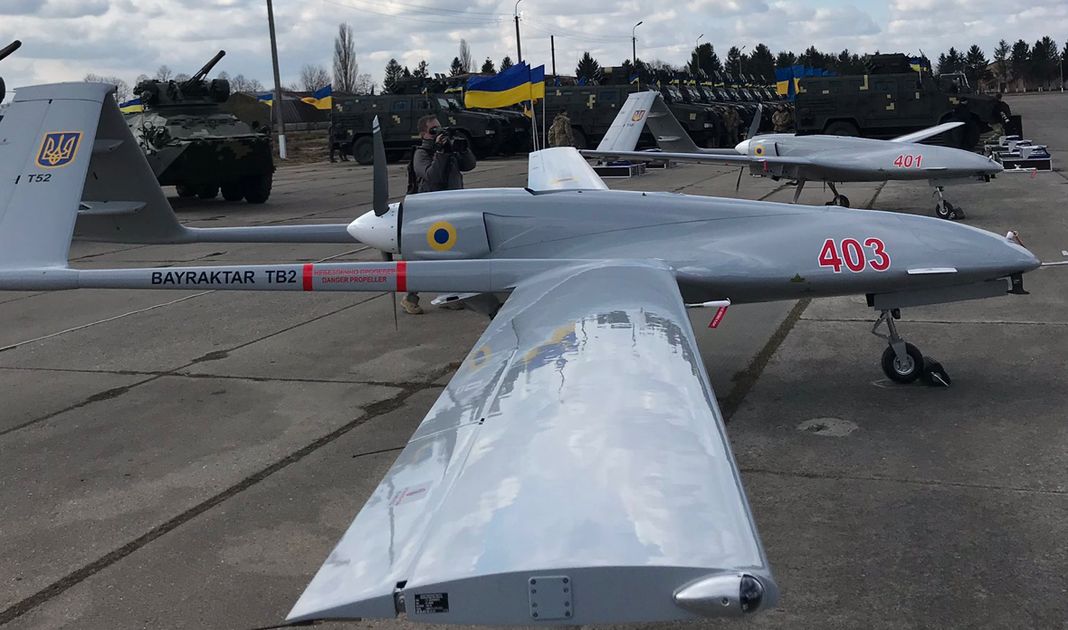Intermarium Weekly 22-28.07.2020

Bayraktar TB-2 (wikipedia.org)
Belarus
The situation in Belarus is evolving and both sides – the opposition and the regime – are carefully observing and examining each other’s plans and capabilities. Both sides are trying to reach the Western capitals and find a mutually beneficial agreement. The regime wants to survive and sees the West as a deterring power towards the opposition. The opposition wants to get permission from the West for a final blow against the regime. International support campaigns for those currently under arrest have been conducted in many capitals of the European Union. Svetlana Tihanovskaia has been active in visiting different cities of Belarus and – most interestingly – it seems to have gained an unprecedented level of support. It is possible to add here that law-enforcement forces are also carefully observing the general situation and they can make a choice at the final stage of rivalry between the opposition and the regime if the power of opposition is overwhelming. Actually, the most important element of the opposition’s strategy is targeting and undermining law-enforcement forces and their loyalty to Lukashenka. The opposition is utterly against the idea of boycotting the elections as they feel that only mass participation can change the situation in the country.
Polish Sejm supports the Opposition and Lithuanian MPs demand sanctions from the EU
In the Polish Parliament, a number of politicians have united to support civil society and help in the democratization of Belarus. The association should also take care of the development of good-neighborly cooperation. The parliamentary group for Belarus includes deputies from various political circles. Robert Tyszkiewicz from the Civic Platform Party became chairman. His deputies were Adam Lipiński from the Law and Justice Party, Wiosna MP Monika Falej and Michał Szczerba from Civic Platform. Piotr Borys, a deputy from the Civic Platform, was elected as a secretary.
Lithuanian politicians have urged the European Union to impose sanctions against the government of Belarus. The appeal was signed by the chairmen of the Lithuanian Seimas committees on European and foreign affairs, Gediminas Kirkilas and Juozas Bernatonis, opposition leader Gediminas Landsbergis, liberal leader Viktoria Chmilyte-Nielsen and several other members of the Seimas, as well as representatives of the European Parliament. The letter talks about the need to impose sanctions against representatives of the Belarusian authorities who are responsible for the current repressions. Strikingly, Vilnius is presenting the most belligerent policy towards Minsk.
Russia blames the West for interference in the internal affairs of Belarus
Russian Foreign Ministry spokeswoman Maria Zakharova said that Brussels, initiating a resolution on the human rights situation in Belarus on the eve of the presidential elections, is demonstrating interference in the country’s internal affairs. At the same time Russia is pushing Minsk for closer integration into the Union State.
Belarusian Nuclear Power Plant
The launch of the BelNPP is postponed to August 2020. However, the work at the first power unit is completed up to 98%. Vasily Polyukhovich, Director of the Department for Nuclear Energy at the Ministry of Energy, said: “In August, we plan to start an important stage in the construction of the nuclear power plant – loading nuclear fuel into the reactor and the transition to physical start-up, and then to power start-up”. At the second power unit, 72% of construction and installation works have been completed. And now preparations are underway for installation work at the second power unit. Lukashenka wants to use the opening ceremony as political capital in the upcoming elections.
What is Lukashenka up to?
Lukashenka is preparing for the “final battle”. He recently gathered together with his “trusted persons” – around 30 people from different professional fields. The list of people was changed three times. He put it straightforwardly that “we are facing an acute phase of the political process in the country.” Alexander Lukashenko is convening an extraordinary session of the House of Representatives and the Council of the Republic in order to deliver the annual message. The meeting will take place on 3 August.
He has said many times that one of the main reasons for the tensions in society is because of the work of non-state actors and specifically non-state oppositional media. This week he criticized the MFA and his Administration for their reluctant policy towards non-state media. Lukashenka in this regard stated, “Yes, and in our government, the Ministry of Foreign Affairs, everyone is sitting, waiting for the president’s command. What is this attitude towards the country? BBC, Svoboda, Free Europe and so on, these streams … I’m not talking about tendentiousness, they also call for riots. Why do you put up with this? You accredited them here. There is no need to wait for an end to the electoral campaign. Drive them out of here if they do not comply with our laws and invite people to the Maidan.” For balance he criticized the work of the Russian tabloid “Komsomolskaya Pravda” and he again reminded his audience that Moscow is engaged in the provocations – “You see, their leader, sitting in Moscow, or in the Kremlin, made a statement, and a tendentious presentation of information began.”
Lukashenka prepares for the final battle
During a visit to military unit 3214 of the internal troops in Uruchye, Lukashenka demonstrated how the security forces can disperse demonstrators with the help of water cannons. A demonstrative dispersal of the «protest action» attended by the head of state was shown on “Belarus-1”. For the head of state, riot police officers showed a special tactical lesson with a special-purpose battalion. On the one hand, the security forces in full gear with water cannons dispersed «the protesters», who were also riot police. It was definitely a direct message to the opposition leaders that the regime is ready to bite back if you are going to attack us.
It is noteworthy that the visits of the head of state to the special brigades during July have become quite frequent. So, on July 24, Lukashenko arrived at the 5th separate special-purpose brigade in Maryina Gorka. On July 16, the head of state addressed the soldiers of the 103rd Vitebsk Separate Guards Airborne Brigade. On July 7, the head of state replaced the chairman of military intelligence, and on July 6, he met with KGB workers and handed out the general’s shoulder straps to the senior officers.
The U.S. is in contact with Minsk
As reported by the press service of the Belarusian Foreign Ministry, on July 22, Vladimir Makei had a telephone conversation with the US Deputy Secretary of State for Political Affairs David Hale. According to the Belarusian Foreign Ministry, the conversation took place at the initiative of the American side. The two sides discussed topical issues of Belarusian-American relations, especially the current issues of the regional and international agenda. At the request of the American side, Makei informed his interlocutor in detail about the nuances of the presidential campaign in the Republic of Belarus.
Valery Tsepkalo flees to Russia
Former presidential candidate Valery Tsepkalo left Belarus with his children. Veronika Tsepkalo confirmed that her husband had left Belarus with the children after receiving information about possible detention. Veronica herself remains in Belarus to continue working in the joint headquarters of Svetlana Tikhanovskaya. Earlier, Svetlana Tikhanovskaya also took the children from Belarus to the European Union after threats. Recall that the reason for refusing to register Valery Tsepkalo as a presidential candidate was the insufficient number of valid signatures – less than 100 thousand. Why did he decide to go to Russia?
The answer maybe because of the no-border control between Russia and Belarus. Tsepkalo stated that if the country is going to be “hot”, even before the elections he is ready to come. From Moscow, he sent a video statement and announced that he is creating the “Committee of People’s Unity.” His main message in the official statement is that Lukashenka must be overthrown. His presence in Moscow can be considered as the Kremlin’s tolerance to the Belarusian opposition.
Svetlana Tikhanovskaya’s Presidential Program
Presidential candidate Svetlana Tikhanovskaya has published her presidential program. The document was published on the page of Svetlana Tikhanovskaya. The most important elements of this program are as follows:
- in no case participate in early voting, so that your vote is not stolen, and convince your friends, neighbors and acquaintances of this;
- to come to the polls on August 9, to vote for me, Svetlana Tikhanovskaya;
- become independent observers at polling stations and defend your vote.
Foreign policy
- Independence is our absolute value, we do not sell it, do not trade, do not discuss it.
- We are peaceful people and will be friends with everyone, but only in the interests of our own country.
- We must create a partnership on an equal footing, not dependence on a gas or credit “needle”. By “needle” they mean the Russian Federation. Thus, it is possible to assume that even the revolution in the country does not change the foreign policy direction of the country.
- In this interview, she additionally clarified that she is against the Union State and stated that the country does not need such an institution.
The EU is concerned with the Human Rights situation
The EU is concerned about the human rights situation in Belarus and calls for the release of political activists. This was discussed at an extraordinary coordination meeting on July 23 between high-ranking European officials and the official Belarusian delegation in Brussels. The Belarusian side was represented by the Deputy Foreign Minister Oleg Kravchenko, the EU – by the Deputy Head of the European External Action Service for Europe and Central Asia Luc Devin. The report of the EU Delegation to Belarus notes that “the discussion centered on the situation in the field of human rights and democracy in the context of the presidential elections to be held in Belarus on August 9”.
Ukraine
The “Lublin Triangle”: Poland-Ukraine-Lithuania
Foreign Minister Dmytro Kuleba announced the creation of a new format called the Lublin Triangle, which includes Ukraine, Poland and Lithuania. A format that will become an important element of the development and strengthening of Central Europe, but also the strengthening of Ukraine as a full member of the European and Euro-Atlantic family. According to him, cooperation between the three countries will not be limited to defense issues, such as the creation of a joint brigade LitPolUkrbrig. First of all, we are talking about strengthening economic cooperation, trade and tourism. As a reminder, during his visit to Warsaw, Kuleba said that Ukraine expects Poland to play a leading role in the future international platform for the de-occupation of Crimea.
Ukraine-China: Visa-Free Regime
Even Coronavirus cannot stop the “friendship” between Kyiv and Beijing. From August 1 to January 31, 2021, Chinese tourists will be able to enter Ukraine without a visa. The President of Ukraine, Volodymyr Zelenskyy, signed a decree “On the temporary introduction of a visa-free regime for citizens of the People’s Republic of China who enter Ukraine for tourist purposes.” It is noted that decree No. 295/2020 was signed with the aim of developing friendly relations between Ukraine and China, as well as enhancing bilateral cooperation in the field of tourism. According to the document, for the period from August 1, 2020 to January 31, 2021, a visa-free regime of entry into Ukraine and transit through the territory of Ukraine is introduced for citizens of the PRC entering with a tourist purpose, if the period of their stay in Ukraine does not exceed 30 days within 180 days.
Turkish-Ukrainian Cooperation
A presentation was held in Sumy, in front of the Turkish business delegation, during which the Chairman of the Sumy Regional State Administration noted the prospects for the development of the Sumy airport offering possible flights to European countries, Turkey, China and Kazakhstan. In response, the head of the Turkish group of companies «AKAOGLU GROUP» Ozdemir Akaoglu said that they are interested in its development.
Turkish-Ukrainian Military Cooperation
On July 16-17, a delegation of the state concern «Ukroboronprom» and the state company «Ukrspetsexport» paid a working visit to Turkey. The Ukrainian delegation headed by the General Director of the Concern Abromavichyus, the Deputy General Director for Marketing and Sales Mikhail Morozov and the director of the Ukrspetsexport company Vadim Nozdry held working meetings with representatives of the first Ukrainian-Turkish joint venture Black Sea Shield in Istanbul. The parties discussed the formation of the board of directors of the joint venture, the specifics of planning new joint projects during a pandemic, the prospects for continuing the production and supply of Bayraktar drones for the needs of the Ministry of Defense of Ukraine and deepening cooperation with other enterprises-participants of the Concern Ukroboronprom.
Now the joint venture with Turkey is working on the integration of Ukrainian-made aircraft engines into a new generation unmanned aerial system – “Akıncı” – and a promising new Turkish unmanned strike fighter. Last year, the tests of the first Ukrainian-Turkish combat module Serdar, which was created by the order of a third country, were completed. This is a joint development of the Turkish company Aselsan and the enterprise of Ukroboronprom – the design bureau “Luch” and the state company “Spetstechnoexport”. The enterprises of Ukroboronprom and Turkey are implementing a number of joint projects. In particular, they are now discussing the development and production of modern power plants for ground vehicles, protection systems for armored vehicles and guided weapons. The Turkish company «Aselsan» is one of the main foreign partners of Ukraine in the rearmament of the Armed Forces with new VHF and HF-band tactical communication systems that meet NATO standards. The Turkish operational-tactical Bayraktar TB-2 equipped with MAM-L high-precision bombs of the Turkish company “Roketsan” have been supplied to the Armed Forces of Ukraine. “Black Sea Shield” is the first Ukrainian-Turkish joint venture in the field of precision weapons and aerospace technologies. It was created after the visit of the President of Ukraine Volodymyr Zelenskyy to Turkey on August 8-9, 2019 between Ukrspetsexport Group of Companies, State Enterprise ZMKB Progress named after Academician A.G. Ivchenko and the Turkish company Baykar Defense.
“Sea-Breeze” Exercises
This week the international traditional exercises between Ukrainian and NATO naval forces came to an end. The scale of the exercises was incomparable with previous years, however, some exercises were held. For example, Ukrainian fighters patrolled NATO aircraft in joint combat formations with the P-8 Poseidon in certain areas of the Black Sea to support the operations of groups of ships. They also carried out air-fighter cover for the actions of the Navy of the Armed Forces of Ukraine. According to the commanders of the exercises, the task was completed perfectly. One of the stages in practicing practical actions and achieving compatibility within the framework of the Sea Breeze-2020 multinational exercises were live firing from a helicopter of the Mi-8MSB-V naval aviation brigade.
Ukrainian Space Ambitions
Vice Prime Minister – Minister for Strategic Industries Oleg Urusky believes that Ukraine is capable of implementing the Air Launch project in 3-4 years. The project provides for the launch of light rockets into space from aircraft, not a cosmodrome. “If we are talking about our An-188, a project for a new missile, then this is an investment of up to $500 million. I think in 3-4 years we would have done this under normal funding conditions,” he said. According to Urusky, “this is not so much money now” and it is possible to find an investor for this project not only abroad, but also inside Ukraine. According to him, developers from the Dnieper “dream” of creating a cosmodrome in the steppes near Kherson, although this is unrealistic. Recall that the air-launch project provides for the use of aviation as the first stage for space rockets. You don’t need a spaceport for this, and the launches themselves are cheaper.
Ukrainian De-Industrialization
Ukrainian industrial technologies are fading away. Ukraine recently had its own fully-fledged technologies, but now neither the authorities nor business want to restore it. For example, “Ukrzaliznytsia” is discussing with its American partners a contract for the supply of an additional batch of diesel locomotives (around 40 items). Deputies of the Dnipro City Council decided to purchase 20 more used trams in the German city of Leipzig on a financial lease basis.
The Baltic States
Astravyets NPP and Lithuania
Lithuania is not ready to give up its policy against Astravyets NPP. President Gitanas Nauseda called on the European Council President Charles Michel to get personally involved in addressing the safety issues of the Astravyets NPP. According to the Lithuanian president, Belarus, together with Russia, ignores concerns by the European Commission, EU member states, and experts from the European Nuclear Safety Regulators Group (ENSREG) over a lack of transparency and numerous violations of safety standards in the Astravyets NPP project. Nuclear fuel has already been delivered to the first reactor of the nuclear facility, some 40 kilometres from the Lithuanian capital Vilnius, and preparations are underway for its planned launch in August. Nausėda expressed gratitude for the European Commission’s efforts to ensure the environmental and nuclear safety of the Astravyets plant, but he said the EU’s involvement at the technical level was not enough “to reduce the potential threats of this Russian-led project”. The president called on Michel to send a clear political signal to Belarus’ President Alexander Lukashenko, urging him not to turn the facility on until the safety issues have been resolved, and the EU stress test recommendations are implemented.
Autor
Ridvan Bari Urcosta
Senior Analyst at Strategy&Future






Trwa ładowanie...